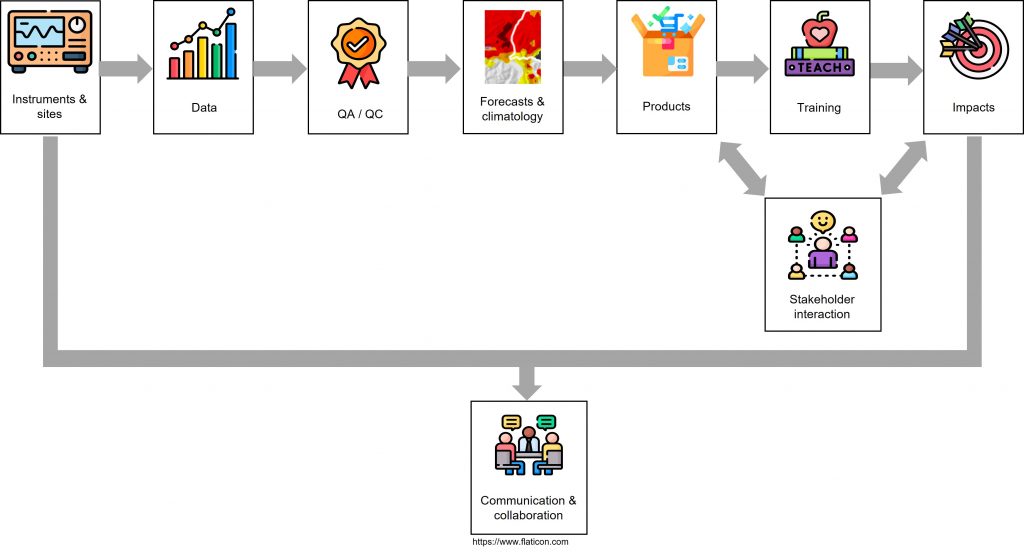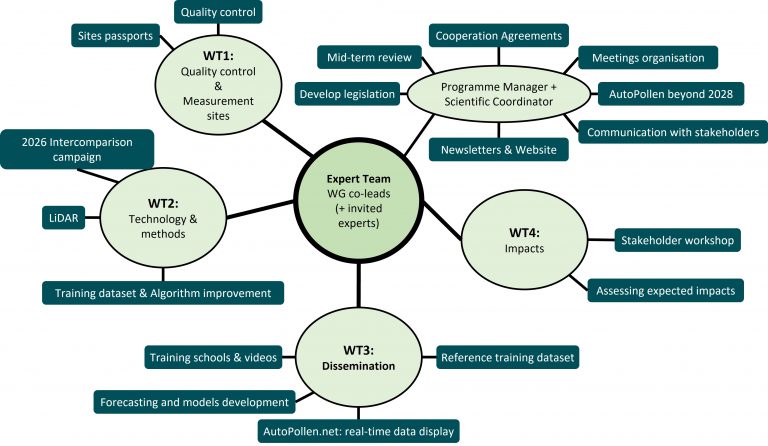The AutoPollen Programme started in 2018 under the auspices of the grouping of European meteorological services, EUMETNET, in response to the need for coordination of activities around automatic pollen monitoring. AutoPollen aims to grow the automatic monitoring network across the continent, covering all aspects of the information chain – from the initial measurement through to products and services co-designed with end-users.
Objectives
The EUMETNET AutoPollen programme seeks to take full advantage of the large potential for progress that automatic pollen and fungal observations provide. It brings together a consortium from across Europe with the multidisciplinary expertise needed to address the challenges along the entire information chain – from the actual observation through to the final end-user defined product. The programme is particularly innovative in its cooperation and standardisation from-the-start approach. It also favours convergence with the aerosol and air quality monitoring communities, which should lead to improved service provision and additional savings.

- The programme aims to:
- Develop an automatic European pollen and fungal spore monitoring network by integrating ongoing and planned projects.
- Serve as a framework for the exchange of multidisciplinary knowledge and expertise, ensuring synergy and collaboration
- Provide recommendations and guidelines regarding all aspects of the information chain
- Define the main standards of automatic pollen and fungal monitoring to ensure the provision of high quality information
- Actively engage with stakeholders to ensure end-products are co-designed to meet their needs
The Expert Team is divided in four Working Teams with dedicated objectives and topics that overlap, promoting collaboration between all participants.

Participants
AutoPollen includes a wide range of participants, from EUMETNET members to universities, research institutes, and patient organisations, reflecting the diverse landscape of institutes involved in pollen and fungal spore monitoring across Europe. The programme is coordinated by the Swiss Federal Office of Meteorology and Climatology MeteoSwiss.
EUMETNET Members:
- ARSO, Slovenia
- CHMI, Czech Republic
- DHMZ, Croatia in collaboration with the Croatian Institute of Public Health
- FMI, Finland
- HNMS, Greece in collaboration with Aristotle University of Thessaloniki, the National Technical University of Athens and the National and Kapodistrian University of Athens
- IMO, Iceland in collaboration with the Icelandic Institute of Nature Research
- IPMA, Portugal in collaboration with the Universidade de Évora and University of Porto
- Met Eireann, Ireland in collaboration with the Dublin City University
- MeteoLux, Luxemburg in collaboration with the Centre Hospitalier de Luxembourg
- MeteoSwiss, Switzerland
- ZAMG, Austria, in collaboration with GeoSphere Austria
Third Parties:
- Aarhus University, Denmark
- Bavarian State Office for Health and Food Safety, Germany in collaboration with Technische Universität München (TUM - ZAUM)
- Biosense Institute Research, Serbia
- European Aerobiology Society
- European Federation of Allergy and Airways Diseases Patients’ Association
- Edmund Mach Foundation, Italy
- Red Española de Aerobiología and Asociación Española de Aerobiología, Spain
- Sciensano, Belgium, in collaboration with the Royal Meteorological Institute
- Swedish Natural History Museum, Sweden, in collaboration with the Gothenburg University, Umeå University and Swedish University of Agricultural Sciences
- University of Latvia, Latvia
- University of Parma, Italy
- Vilnius University, Lithuania
The Bayerisches Landesamt für Gesundheit und Lebensmittelsicherheit (LGL) funds the EUMETNET AutoPollen instrument intercomparison in 2025 and 2026.
The programme also works with invited collaborators from the Bursa Uludag University in Türkiye and from the Vinnytsia National Pirogov Medical University in Ukraine.
Furthermore, the programme collaborates with several European-level projects and organisations, including: Horizon Europe Project SYLVA (A SYstem for ReaL-Time Observation of Aeroallergens), Copernicus Atmospheric Monitoring Services (CAMS), the COST Action ADOPT (New Approaches in Detection of Pathogens and Aeroallergens – CA18226), EURAMET on the BioAirMet project and Working Group 39 of the European Normalisation Committee (CEN standard development – Technical Committee 264).
Get involved
AutoPollen warmly welcomes interested participants. Please get in touch with us should your institute be interested in participating in the programme (email: autopollen (at) eumetnet.eu).